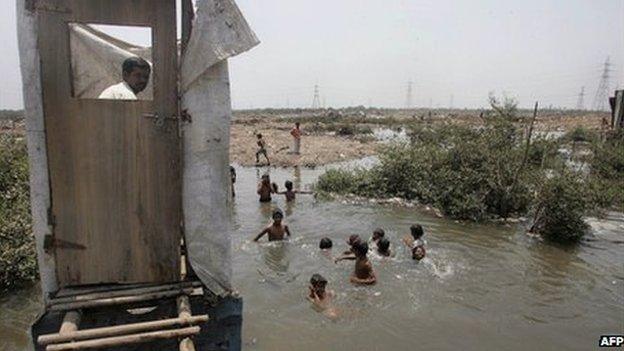Why India's sanitation crisis kills women
- Published

Nearly half-a-billion Indians lack access to basic sanitation
The gruesome rape and hanging of two teenage girls in the populous Uttar Pradesh state again proves how women have become the biggest victims of India's sanitation crisis.
The two girls were going to the fields to defecate when they went missing on Tuesday night.
Nearly half-a-billion Indians - or 48% of the population - lack access to basic sanitation and defecate in the open.
The situation is worse in villages where, according to the WHO and Unicef, some 65% defecate in the open. And women appear to bear the brunt as they are mostly attacked and assaulted when they step out early in the morning or late in the evening.
Several studies have shown that women without toilets at home are vulnerable to sexual violence when travelling to and from public facilities or open fields.
The evidence is glaring.
A senior police official in Bihar said some 400 women would have "escaped" rape last year if they had toilets in their homes.
Women living in urban slums of Delhi reported specific incidents of girls under 10 "being raped while on their way to use a public toilet" to researchers of a 2011 study, external funded by WaterAid and DFID-funded Sanitation and Hygiene Applied Research for Equity.
Women in one slum said when they went out in the open to defecate, local boys stared at them, made threats, threw bricks and stabbed them. Others said they faced "lewd remarks, physical gestures and rape when they relieved themselves in the bushes".
"We have had one-on-one fights with thugs in order to save our daughters from getting raped. It then becomes a fight that either you [the thug] kill me to get to my daughter or you back off," a helpless mother told the researchers, pointing out to the chilling frequency of such assaults.
By one estimate, some 300 million women and girls in India defecate in the open. Most of them belong to underprivileged sections of the society and are too poor to afford toilets. The two girls from Badaun, who reportedly belonged to the lower-rung of a group of castes called Other Backward Classes (OBCs), were among them and paid with their lives.
"This vicious, horrifying attack illustrates too vividly the risks that girls and women take when they don't have a safe, private place to relieve themselves," says said Barbara Frost, chief executive of WaterAid. "Ending open defecation is an urgent priority that needs to be addressed, for the benefit of women and girls who live in poverty and without access to privacy and a decent toilet."
Experts believe that India needs to scale up its war on sanitation with a special emphases on women.
It needs to build more private toilets with sewerage connections when space is available and shared toilets when space is scarce. Community toilets have worked in many places and flopped in others like the city of Bhopal, where, a study revealed, only half as many women as men used the toilets because of their distance from home.
This is not a problem in India alone: violence against women on the way to or from public toilets have been reported from countries like Kenya and Uganda. But for a country which aspires for superpower status, lack of toilets is an enduring shame.
On his stump, the new prime minister Narendra Modi of the Hindu nationalist BJP had promised, "Toilets first, Temples later". He needs to do that sooner to save lives of more women.